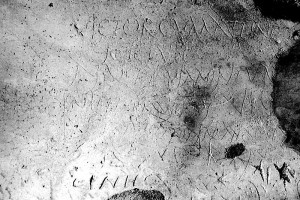In AD 79 Vesuvius erupted burying Pompeii in ash, preserving the city like a time-capsule for future scholars. Since its re-discovery, Pompeii has attracted multitudes of tourists, archaeologists and classicists alike. A rich supply of what may be learned from Pompeii lies in the graffiti, which provide insightful information into the thoughts of the average ancient Roman. From reading the graffiti from Pompeii, we may learn what the average Roman felt it was worth writing down.
Amelia W. Eichengreen
1 (CIL IV 5092)
Amoris ignes si sentires, mulio
Magi[s] properares, ut videres Venerem.
Diligo iuvenem, Venustum; rogo, punge, iamus.
Bibisti: iamus, prende lora et excute,
Pompeios defer, ubi dulcis est amor
Meus es[…..]
If you could sense the fire of love, mule-driver
You would hurry more, so that you might see Venus.
I esteem a youth, Charmer; please, strike (the whip,) let’s go.
You’ve had a drink, let’s go, seize and drive the reins
Carry (me) to Pompeii, where my sweet love is
2 (CIL VI 1454)
Hic habitat
felicitas
Here lives
luck
3 (CIL IV 1796)
amplexus teneros hac si quis quaerit in u[rbe],
expect[at ceras] nulla puella viri
If in this town anyone seeks tender embraces,
No girl awaits wax tablets from her man
4 (CIL IV 2146)
Vibius Restitutus hic
Solus dormivit et Urbanam
Suam desiderabat
Vibius Restitutus here
slept alone and
he was desiring his Urbana
5 (CIL IV 2413)
Cestilia, regina Pompeianoru,
Anima dulcis, va[le]
Cestilia, queen of the Pompeiians,
a sweet soul, goodbye
6 (CIL 9171)
Sic [t]ib[i] contingat semper florere, Sabina; contingent
formae sisque puella diu
Thus, may you flourish forever, Sabina, and may your attain beauty;
And stay young for a long time
7 (CIL IV 1234)
Pupa quae bella is(=es) tibi
Me misit qui tuus es[t]. Vale
Girl who is beautiful,
He who is yours sends me to you. Goodbye
8 (CIL IV 8807)
Ceio
et mul-
tis pupa
venust-
a
Girl, lovely to Ceius and many others
9 (CIL IV 1780)
Quid faciam vobis ocilli (=oculi) lusci
What may I do for you, runny-eyed eyes
10 (CIL IV 1970)
Noete lumen
Va[le] va[le]
Usque va[le]
Noete, (my) light
Goodbye, goodbye
Continuous goodbyes!
11 (CIL IV 8177)
[v] ale dulcissimae amantissimaeque
…que salutem ave
Goodbye to the sweetest and most beloved of girls
…and greetings, hello
12 (CIL IV 1928)
Scribenti mii (= mihi) dictat Amor mostratque Cupido
…peream sine te si deus esse velim
Love speaks to me writing and Cupid shows me
…Let me perish without you if I should wish to be a god
13 (CIL IV 8364)
Secundus
Prime suae ubi-
que isse salute.
Rogo, domna,
ut me ames
Secundus,
goes to greet
his Prima wherever she is
Please, mistress,
love me!
(lit. I ask, mistress, that you love me)
14 (CIL IV 2414)
Propero. Vale, mea Sava;
fac me ames
I am hurrying. Greetings, my Sava
Make it that you love me!
15 (CIL IV 10234)
Amo te Facilis
fac mi (=mihi) copia
I love you Facilis
Do everything to me
16 (CIL IV 2015)
Isthmus Successe ubique salute et quod te rogavi
Ut quod iurasti
Isthmus greets Successa where she is, and that which I asked you
and that you swore to it
17 (CIL IV 6865)
[puell]ae nostrae feliciter
[perp]etuo rogo, domna; per
[Venere]m Fisicam te rogo ni me
…..
[ …]us. Habeto mei memoriam
Greetings to my girl
I continuously ask, mistress; by
Venus Fisica I ask you, don’t
….. me
…. Hold a memory of me.
18 (CIL IV 8824)
Valen[s], domin[a]
Valens, domina essem.
Salutem rogam[us]
Valens, (I am) a lady
Valens I wish I were a mistress
I ask for health
19 (CIL IV 1893)
Surda sit oranti tua ianua, laxa ferenti.
Audiat exclusi verba receptus [a]man[s]
Your door should be deaf to prayers, but open to one bearing gifts.
Let the lover, having been admitted, hear the words of the one shut out.
20 (CIL IV 1894)
Ianitor ad dantis vigilet; si pulsat inanis,
surdus in obductam somniet usqu[e] seram
The doorkeeper must be awake for (bearers of) gifts, if (someone) empty knocks,
Let him sleep deaf against an obstructed bolt.
21 (CIL IV 7086)
Marcus Spedusa amat
Marcus loves Spedusa
22 (CIL IV 4637)
Cornelia Hele[na]
Amatur ab Rufo
Cornelia Helena
Is loved by Rufus
23 (CIL IV 2060)
Romula
hic cum
Staphylo
moratur
Romula here delayed with Staphylos
24 (CIL IV 8792a)
Antiochus
hic mansit
cum sua
Cithera
Antiochus
remained here
with his
Cithera
Chosen and translated by Amelia W. Eichengreen.
The above text is provided by the Corpus Inscriptionum Latinarum


No Comments